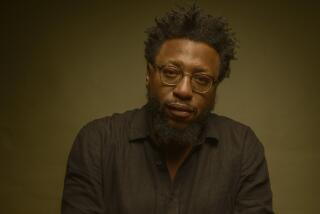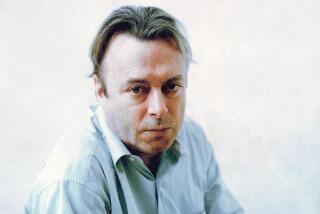For candidates, ‘Bell’ tolls true
- Share via
Two men. One book. What gives?
They agree about few things, but they do agree about this: Both John McCain and Barack Obama list “For Whom the Bell Tolls” among their favorite books. Thus the presumptive presidential nominees of the two major political parties chose -- out of all the millions of magnificent volumes they could have selected -- a novel by Ernest Hemingway first published 68 years ago, filled with violence and heroism and at least one oft-ridiculed sex scene.
As rituals of the election season go, few are more predictable nowadays than the interrogation of candidates’ cultural preferences. “What’s on your iPod?” is the new staple of candidate quizzes, along with venerable categories such as favorite TV series, movie and novel. Yet as much of a cliche as it has now become, the polling of candidates about what they read, watch and listen to is worthwhile. Tell me how you feed your mind and fill your free time, and I’ll tell you who you are.
The only problem, of course, is that people running for public office can’t really be candid. They are forced to maintain a large staff of savvy personnel to carefully craft their images; a single careless aside that one prefers People to Foreign Affairs and it’s curtains for those presidential ambitions. So a candidate’s self-proclaimed cultural proclivities must be taken with a hefty dose of skepticism.
Yet as Democrats and Republicans prepare for their upcoming conventions, the fact that both McCain and Obama cite “For Whom the Bell Tolls” as their fave read is revealing on two levels: If it’s just the candidate’s cynical notion of a book he ought to say he likes, to sound like a brave and manly leader, then that gives us a good idea of the candidate’s conception of voters’ expectations (and degree of gullibility). If, on the other hand, it’s an accurate reflection of the candidate’s true taste in fiction, then that gives us a nice little window onto his psyche. Either way, we learn something.
I’ve written before about my complicated relationship with Hemingway. Like most of his works, “For Whom the Bell Tolls” bored me silly when I first read it -- all those “thous” and “thees,” all that wine-chugging and onion-eating. Upon a recent rereading, though, I was moved and enthralled. I kept thinking of critic Richard Ellmann’s line about James Joyce: We are still learning how to be his contemporaries. The same is true of Hemingway. He wrote about events that seem dusty with age, such as the Spanish Civil War, during which “For Whom the Bell Tolls” is set, but the issues and the basic human conflicts are startlingly contemporary.
Hemingway’s novel is about the terrible things one must sometimes do in wartime. About learning what matters. About deciding what is worth dying for.
Its protagonist, an American named Robert Jordan, is a terrorist -- a terrorist for the cause of freedom and justice, to be sure, but a terrorist nonetheless. When Pilar, a remarkable Spanish woman who often advises Jordan in matters of both love and war, is asked what happened in a certain battle, she replies, “Much. Much. And all of it ugly. Even that which was glorious.”
I remembered the war parts of “For Whom the Bell Tolls” quite well. What I didn’t remember -- prejudiced as I was against Hemingway and his simple, forthright prose, with sentences as basic and unbudging as tree stumps -- is the novel’s immense tenderness. Jordan’s love for Maria is boundless: “What you have with Maria,” he tells himself, “whether it lasts just through today and a part of tomorrow, or whether it lasts for a long life is the most important thing that can happen to a human being.”
Admittedly, though, the love scenes are easily mocked; it’s hard to hold back the snickers when one character calls another “little rabbit.”
Of all the novels that might have popped up on the putative nightstands of both McCain and Obama, I’m glad it was “For Whom the Bell Tolls.” It’s a novel about love and sorrow, about sacrifice and risk and death and regret, but it’s also about joy: the joy of living for something more significant than one’s own comfort.
Jordan’s thoughts as the novel winds down are good ones for presidents to remember: “The world is a fine place and worth the fighting for.”
More to Read
Sign up for our Book Club newsletter
Get the latest news, events and more from the Los Angeles Times Book Club, and help us get L.A. reading and talking.
You may occasionally receive promotional content from the Los Angeles Times.






